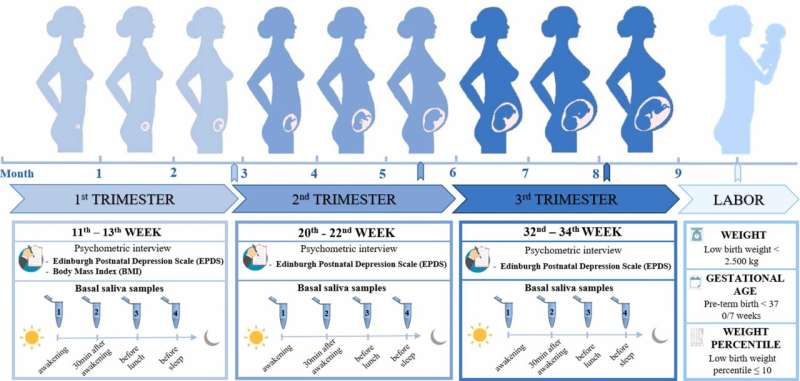This article has been reviewed according to Science X's editorial process and policies. Editors have highlighted the following attributes while ensuring the content's credibility:
fact-checked
trusted source
proofread
Altered cortisol cycle in pregnant women with depressive symptoms may affect gestation process

Women with depressive symptoms during pregnancy may experience an alteration in the circadian rhythm of cortisol—a hormone that is necessary for fetal development—which could affect the course of pregnancy. Cortisol increases naturally in pregnant women during pregnancy, but excessive cortisol levels in early pregnancy can negatively impact fetal development, especially if cortisol increases over prolonged periods and especially when cortisol levels are usually lower (e.g., at night).
In pregnant women with depressive symptoms, the increase in total cortisol levels between the first and second trimester of pregnancy is very pronounced. In particular, the increase in the second trimester may be related to a higher rate of preterm birth and lower percentile birth weight.
These are the main conclusions of a study published in the journal Psychoneuroendocrinology and led by Professor Lourdes Fañanás, from the Faculty of Biology and the Institute of Biomedicine of the University of Barcelona (IBUB), in collaboration with the Hospital Clinic de Barcelona's BCNatal and Hospital Sant Joan de Déu. Researchers from the Centre for Biomedical Research in Mental Health Network (CIBERSAM) and the Centre for Biomedical Research in Rare Diseases Network (CIBERER) have also participated in the study.
When cortisol levels increase at night
During pregnancy, pregnant women undergo many physiological and psychological changes. During gestation, it is common for women to have depressive symptoms which are not usually diagnosed during regular check-ups. However, these symptoms could be related to a deregulation of the cortisol's circadian rhythm.
This depressive symptomatology can cause alterations in the first and second trimester of the pregnancy. "Pregnant women cannot reduce enough the cortisol levels at night, when they should be significantly lower," says Águeda Castro, first signing author of the article and member of the Department of Evolutionary Biology, Ecology and Environmental Sciences of the UB and researcher of the CIBERSAM group.
"These conditions could affect the fetus, sensitizing its own stress response system—the hypothalamic-pituitary-adrenal (HHA) axis—or by direct toxicity on neurons," she adds.
The study focused on a cohort of 112 women in their first pregnancy (ages 18–40). During the pregnancy, the researchers analyzed, each trimester, the cortisol circadian rhythm, stress perception and the mothers' depressive symptoms.
"Our results show the importance of assessing subclinical symptoms of depression, or situations of high psychosocial stress, in mothers throughout their pregnancy and not only in the moments closest to childbirth," says Professor Lourdes Fañanás (UB-IBUB-CIBERSAM), coordinator of the study. She adds, "This is relevant even if there is no previous history of psychiatric illness or depression in mothers."
More information: Águeda Castro-Quintas et al, Diurnal cortisol throughout pregnancy and its association with maternal depressive symptoms and birth outcomes, Psychoneuroendocrinology (2023). DOI: 10.1016/j.psyneuen.2023.106930




















